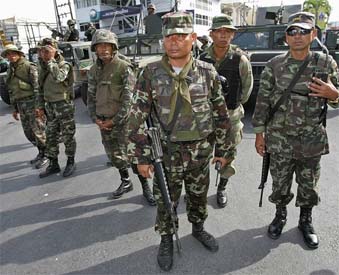Thai army denies officials behind mosque massacre in deep South
 Pattani, Thailand - A Thai army spokesman on Tuesday denied that authorities were behind a brutal attack on a mosque that left 11 people dead and 13 wounded.
Pattani, Thailand - A Thai army spokesman on Tuesday denied that authorities were behind a brutal attack on a mosque that left 11 people dead and 13 wounded.
Six unidentified assailants wearing ski masks opened fire Monday evening on both entrances of a mosque while about 100 Thai Muslims were attending evening prayers in the Cho Ai-rong district of Narathiwat Province, 750 kilometres south of Bangkok, killing 10 people on the spot, army spokesman Colonel Prinya Chaidilok said.
Another person died in hospital.
"We don't know which insurgent group was responsible for this inhuman attack, but I can confirm no authorities were involved," Prinya said.
Cho Ai-long villagers, however, said they suspected the military rather than Muslim militants.
"I'm sure that no Muslim insurgent group would shoot at a mosque because for them religion is sacred," said one villager who asked to remain anonymous.
Similar attacks on mosques in the past have been blamed on authorities or paramilitary troops, sources said.
About 66,607 army and paramilitary troops are based in the deep South - consisting of Narathiwat, Pattani and Yala provinces - which have a population of less than 2 million, more than 80 per cent of whom are Muslim in predominately Buddhist Thailand.
Parliament was scheduled June 15 to launch debates on next year's budget, which was slated to reduce military spending on all but the most necessary items in light of a revenue shortfall this year.
Prime Minister Abhisit Vejajjiva, who travelled to Malaysia Monday to seek Malaysian assistance in solving the southern security problem, called an emergency meeting Tuesday with top military brass in Bangkok to discuss the latest killings, sources said.
More than 3,500 people have been killed in the insurgency over the past five years in the deep South.
The area comprised the former Islamic sultanate of Pattani more than 200 years ago before being conquered by Thailand.
"Let me reiterate that my government's approach is based on the belief that the key to peace and security is justice and opportunities," Abhisit said Monday at a press conference in Kuala Lumpur with his Malaysian counterpart, Najib Razak.
Najib said Malaysia, a predominantly Muslim nation, had agreed to help the Thai government, adding that both leaders were planning to "go to the ground" and speak to people in the affected areas.
With closer cultural, religious and linguistic ties to neighbouring Malaysia, Thailand's deep South has been the scene of a long-simmering separate struggle that took a turn for the worse in January 2004 when Muslim militants attacked an army depot, killing four soldiers and taking 300 weapons.
Army reprisals on the insurgents further antagonized the ethnic Malay segment of the local population against the Thai government. (dpa)